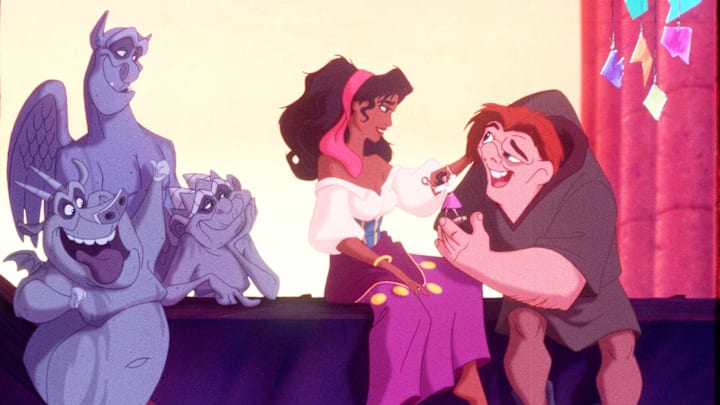In January 2000, Andy Mooney left his job as Nike’s chief marketing officer to take over Disney’s floundering consumer products division. Mere weeks later, he witnessed a strange phenomenon at Disney on Ice.
“Standing in line in the arena, I was surrounded by little girls dressed head to toe as princesses,” Mooney told The New York Times Magazine in 2006. “They weren’t even Disney products. They were generic princess products they’d appended to a Halloween costume.”
A Franchise Is Born
It’s hard to imagine a world where you’d have to DIY a Disney princess dress; official products now saturate the market year-round. But that wasn’t the case back in 2000. A character’s merchandise was tied to their movie release—and you definitely couldn’t, say, buy a backpack bearing an image of Cinderella, Ariel, and Belle.
“The prevailing wisdom at the studio was that somehow having the princesses gang together would destroy their individual mythology and therefore the value of their films,” Mooney told Bloomberg in 2015.
But his Disney on Ice experience had convinced him of the sales potential in licensing out a whole group of Disney princesses from all eras, independent of release dates. So he created the Disney Princess franchise, complete with best practices that would help preserve an air of distinctiveness for each character.
For one thing, they couldn’t dress too similarly: Since Cinderella wore a blue gown, Sleeping Beauty’s had to be pink (bully for Flora). They also weren’t allowed to make eye contact with each other, though plenty of modern merch—not to mention a memorable crossover event in 2018’s Wreck-It Ralph sequel—proves that this rule is no longer in effect.
Snow White, Cinderella, Aurora (a.k.a. Sleeping Beauty), Ariel, Belle, Jasmine, Pocahontas, and Mulan are generally cited as the starting eight. But throughout the early aughts, the collection included Peter Pan’s Tinker Bell and The Hunchback of Notre Dame’s Esmeralda, too. Both have since lost their titles, and as far as the internet knows, Disney has never officially explained why. Regarding Tinker Bell’s removal, Mooney said, “We’d always debate over whether she was really a part of the Princess mythology. She really wasn’t.”
Ice, Lust, and Pixie Dust
But don’t cry for her, Disney adults. Everyone’s favorite pixie dust provider quickly went on to head up her very own franchise: Disney Fairies, which launched in 2005 with Fairy Dust and the Quest for the Egg, a novel by Ella Enchanted author Gail Carson Levine. Subsequent books, movies, and TV shows featuring Tink and her fairy friends soon followed. In other words, it seems that Tinker Bell was only stripped of her dainty tiara to make room for a big old crown and a kingdom to match. (She also got a star on the Hollywood Walk of Fame in 2010.)
Tinker Bell’s trajectory sheds light on the likely reason Anna and Elsa aren’t technically in the Disney Princess club, either: Frozen is huge enough to be its own franchise. Disney is happy to license out a baker’s dozen of beloved heroines in one fell swoop, but Arendelle’s sororal golden geese are sold separately. Even when Frozen content bleeds into Disney Princess territory, the franchises remain distinct. Take, for example, the copy below Tales of Courage and Kindness on the Disney Princess hub page: “Explore 14 original Disney Princess and Frozen stories.”
Esmeralda is a different story. According to the most common theory behind her removal, she was deemed not marketable to or suitable for kids. It wouldn’t be fair to blame Esmeralda herself for that—she’s as kind-hearted, clever, and intrepid as any card-carrying Disney Princess. But The Hunchback of Notre Dame is infamous for its mature themes. The plot centers on Claude Frollo’s genocidal plans for Paris’s Roma population; and his villain song, “Hellfire,” is a panicked plea to the Virgin Mary for help in slaking his lust for Esmeralda. (“Destroy Esmeralda / And let her taste the fires of hell / Or else let her be mine and mine alone.”)
In a 2010 press release marking the Disney Princess induction of The Princess and the Frog’s Tiana, Disney specified that the franchise was all about letting little girls “act out scenes from Disney’s wholesome, timeless and cherished fairy tale film classics.” It seems possible that the company decided The Hunchback of Notre Dame, and Esmeralda by extension, didn’t exactly fit the bill.
Again, without any official word from Disney, these are still just theories. The only thing we know for sure is that Tinker Bell and Esmeralda didn’t lose their Princess status because they aren’t princesses in their stories. Founding member Mulan, after all, has never been one.
The Official Disney Princess List
As it stands, here are the 13 characters who make up the Disney Princess franchise:
- Snow White (Snow White and the Seven Dwarfs)
- Cinderella (Cinderella)
- Aurora (Sleeping Beauty)
- Ariel (The Little Mermaid)
- Belle (Beauty and the Beast)
- Jasmine (Aladdin)
- Pocahontas (Pocahontas)
- Mulan (Mulan)
- Tiana (The Princess and the Frog)
- Rapunzel (Tangled)
- Merida (Brave)
- Moana (Moana)
- Raya (Raya and the Last Dragon)
